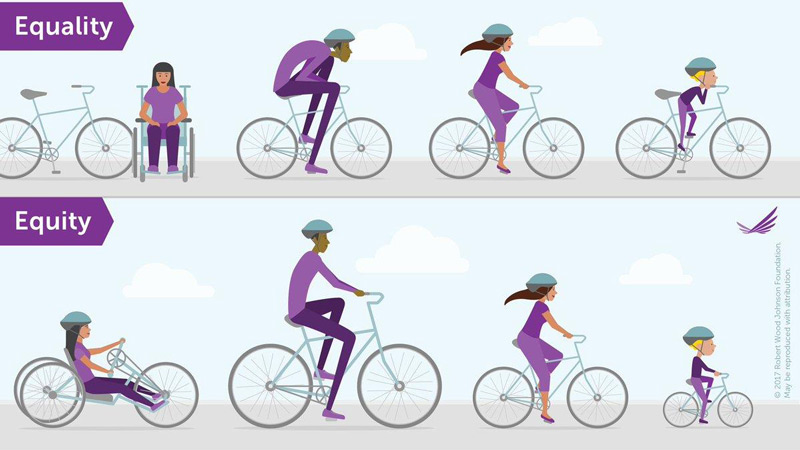
- Diversity, Equity, Inclusiveness and Accessibility (DEIA) in Online Courses
- The “what” and “why” of DEIA
- Simple strategies to promote DEIA
- Premier of the WVC Instructional Film Festival
- WTF - Webinars and Trainings for Faculty
- @ONE webinars and courses
- Friday WOWs (WVC Online Workshops)

Diversity, Equity, Inclusiveness and Accessibility? More than just the latest buzzword in education, DEIA is important for the success of our students, the mission of the California Community College system to “advance California’s economic growth and global competitiveness”, and our future!
In education, diversity means that we acknowledge, respect, and embrace the differences of individuals within the WVC community, including but not exclusive to differences in age, race, ethnicity, disability, sexual orientation, gender, socio-economic status, life experiences, and backgrounds.
As noted by the American Council on Education in its statement “On the Importance of Diversity in Higher Education”, diversity benefits the college and our students in multiple ways:
- Diversity enriches the educational experience and provides students with the opportunity to interact with others in a safe environment;
- It promotes personal growth and a healthy society by challenging stereotypes and preconceptions;
- It strengthens communities and the workplace by preparing students to become caring citizens with mutual respect for one another;
- By making more effective use of the talents and capabilities of students from diverse backgrounds, cultures, and perspectives, it enhances our country’s competitiveness.
Equity in education means providing every student with the individual resources and support they need to reach the common goals of their in-person or online course. Key emphasis is on individual! Because we are different from one another, our needs are also varied. So while we may all be given the same bicycle to ride from point A to point B (which would reflect equality), the bicycle for each individual accommodates that individual’s needs (I.e., equity).

Image from betterbikeshare.org
To assist with incorporating equity into our online courses, review Peralta Community College’s Online Equity Rubric. The Rubric is a research-based course evaluation tool to help make online courses more equitable for students. Included in the rubric are criteria that address students’ access to technology and support, visibility of the instructor’s commitment to equity and inclusion, common forms of bias, helping students connect relevance of what is being taught with their own lives, and following universal design principles.
Inclusion in online education means creating an environment that welcomes every student and creates for them a sense of belonging. Research shows that both students with and without disabilities learn more in an inclusive class (“Inclusive Education: What it Means, Proven Strategies and Case Studies”, resilienteducator.com). By learning how to help one another, learning improves. In addition, teachers provide instruction in various modalities which helps all students.
We’ve said it before and we’ll say it again, accessibility is the law! Beyond this being a requirement, incorporating universal design principles into your course and learning materials benefits all students. As just one example, by including captioning of videos, students who are visual learners are able to process the video content in a written format. Thus, providing instruction via a wider range of learning styles benefits students without disabilities as well.
- Use images/clipart that reflect diversity. See, the Free and Diverse Image Collection Guide from @ONE
- Include research/writings of scholars in your field that reflect diversity
- Include a diversity statement in your syllabus. See an example statement on pp. 13-15 of Diversity, Equity and Inclusion in Online Learning
- Use different teaching methods/strategies to meet learning styles of students (for ex., videos, interactive exercises)
- Provide alternative methods for students to engage with the class and show their learning
- Allow for adaptive technologies & accommodations
- Provide students with the opportunity to provide feedback on an assignment and/or the course
- Follow basic accessibility guidelines for use of fonts, color, headings, alt text and captions
For more on strategies shared by WVC faculty, view the video of Friday WOW! DEIA in Online Courses where faculty have shared easy and simple ways you can promote DEIA in your online courses!

The WVC Faculty Instructional Film Festival is an interactive live-streamed event showcasing instructional videos created by WVC faculty. Join the fun and watch the 20+ videos that have been submitted by very creative faculty.
Audience Choice! You can participate live during the premiere and vote for the winner of an IFFy (Instructional Film Festival) Award in each category.
Do you need training to satisfy the requirement to teach online/hybrid? Per the WVMFT faculty contract, faculty scheduled to teach an online or hybrid course must either have:
- taught an online or hybrid course within the District prior to Spring 2015, or
- received approval from Office of Instruction. The Faculty Request for Approval to Teach Online/Hybrid form (along with documentation) is to be submitted in a single pdf file to wvc.onlineFREEWEST_VALLEY
Faculty teaching online (synchronous and asynchronous), hybrid or hyflex in Spring 2022 must have met the course requirement outlined in Article 51.
We are excited to continue our series of Friday WOWs this Spring 2022! WOWS are scheduled on the 1st and 3rd Friday of each month, 9:00 AM – 10:00 AM. Thus far, the workshops have covered using creating videos (in preparation for our own WVC Instructional Film Festival!), Popetech, and strategies for DEIA in our courses.
To register for upcoming Friday WOWs, go to the Vision Resource Center available in the WVC Portal! You may find this VRC Tutorial helpful.
| Topic | Dates | Cost |
|---|---|---|
| *Introduction to Teaching with Canvas | July 11 – August 7 July 25 – August 21 August 22 – September 18 |
Free |
| *Introduction to Course Design | April 11 – May 8 July 25 – Aug. 21 |
$85 |
| *Introduction to Asynchronous Online Teaching and Learning | July 25 – August 21 | $85 |
| Introduction to Live Online Teaching and Learning | April 25 – May 8 July 25 – August 7 |
$45 |
| Equity and Culturally Responsive Online Teaching | April 18 – May 15 July 18 – August 14 August 1 – August 28 August 8 – September 4 |
$85 |
| Creating Accessible Course Content | April 11 – May 8 August 15 – September 11 |
$85 |
| 10-10-10 Communication that Matters | July 18 – August 14 August 22 – September 18 |
$85 |
| Assessment in Digital Learning | April 11 – May 8 July 11 – August 7 August 1 – August 28 |
$85 |
| Humanizing Online Teaching & Learning | April 25 – May 22 July 11 – August 7 August 8 – September 4 |
$85 |
| NEW! Equitable Grading Strategies | July 18 – August 14 | $85 |
| Online College Counseling | April 18 – May 16 | Free |
| Online Mental Health Counseling | May 2 – May 16 | Free |
| * Online Teaching & Design | July 11 – October 2 July 25 – October 16 |
$255 |
Courses with * qualify for Article 51 training requirement. To register for a course or for more info on courses, go to the @ONE course catalog.
@ONE also offers several FREE self-paced courses too!
Contact the WVC Online Team

Max Gault
Academic Affairs
Instructional Technology Analyst
(408) 741-2627
[email protected]

Jennifer Keh, Ed.D.
Language Arts and Social Science
Counseling Faculty
(408) 741-2592
[email protected]
LA/SS 2H

Whitney Clay
West Valley College Online
Instructional Designer
(408) 741-2619
[email protected]
Language Arts and Social Science 1B

Janis Kea
Economics
Professor, Economics
(408) 741-2538
[email protected]
LA/SS 2E
The WVC Online Faculty Resources Canvas course shell also has the video recordings of previous Friday WOWs, with links to resources that were shared at each session. If you don’t see this course on your Canvas Dashboard, just email the WVC%20Online%20team so that we can add you into the course shell.
To join 290+ of your colleagues in this Canvas group and access the collection of resources curated specifically for WVC instructors, email wvc.onlineFREEWEST_VALLEY
